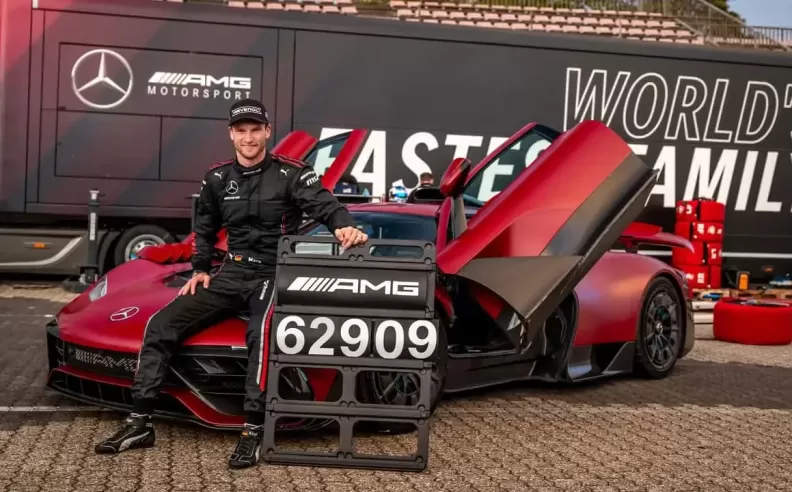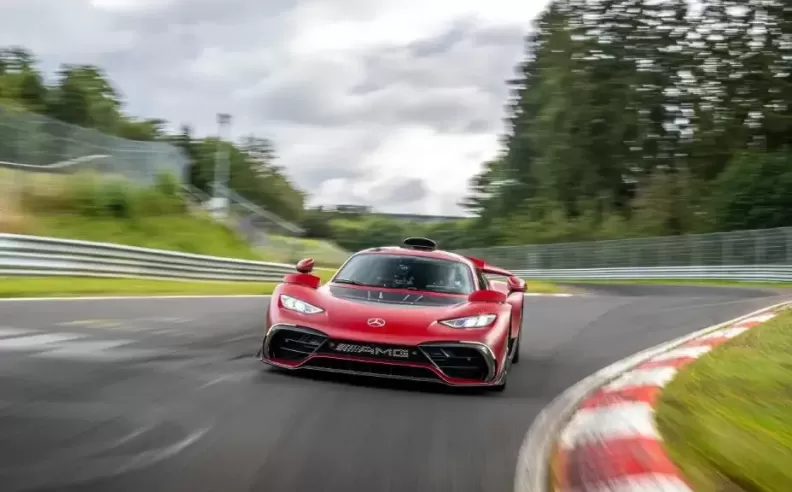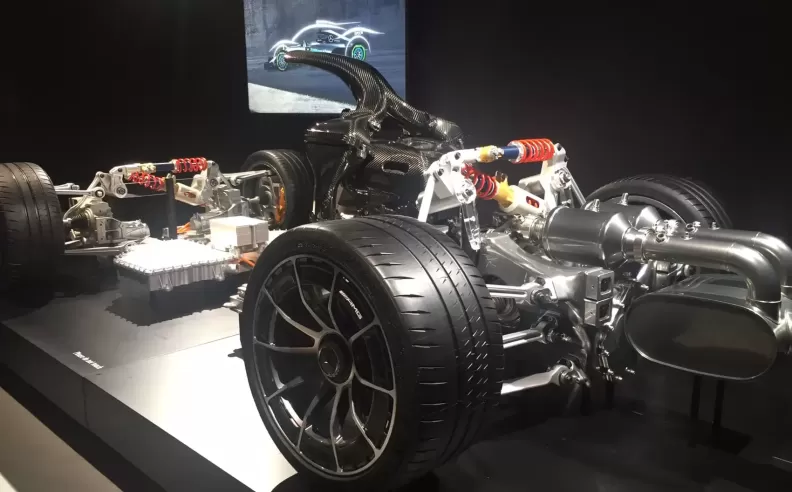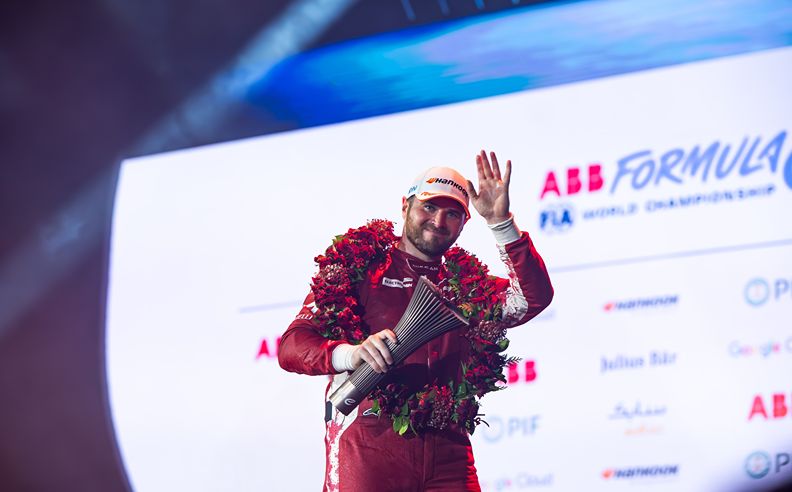
The Mercedes-AMG ONE has been the fastest production car on the Nürburgring-Nordschleife since October 2022 and has been unrivalled ever since. The only rival is the ONE itself. Now Mercedes AMG brand ambassador and DTM driver Maro Engel has once again significantly improved the lap time he set. With an officially measured and notarised time of 6:29.090 minutes for the 20.832-kilometre track, the hypercar with Formula 1™ technology beat its own record for production vehicles by over five seconds. This makes the Mercedes AMG ONE the first road car to beat the magic mark of 6:30 minutes. It is also the only series hybrid hypercar to date to have taken on the world's most demanding racetrack and is the undisputed leader in the super-sports-car class. In order to achieve the lofty goals they had set for themselves, meticulous preparation was necessary. In addition, the track conditions had to be ideal in order to beat the 6:30 minute target. On September 23, 2024, at 6:56 p.m., on his third timed lap, Maro Engel achieved the new record. With temperatures of 15 degrees Celsius (air) and 20 degrees Celsius (asphalt), the legendary Nordschleife was dry throughout and offered perfect grip.
Like Lewis Hamilton and George Russell on their Formula 1™ race weekends, Maro Engel also had to make the best possible use of the hybrid drive's electrical energy. This is particularly challenging, especially with a track length of more than 20 kilometres. Therefore, it is immensely important to use the right sections of the track to recuperate during braking phases and thus store energy in the batteries again.
To do this, Maro Engel utilised the AMG ONE's four-stage Energy Flow Control (EFC) system and in some cases deliberately took his foot off the accelerator a little earlier than he normally would. In technical jargon, this is known as “lift and coast”. Preliminary tests in the driving simulator in Affalterbach and on the Nordschleife itself provided the necessary insights, which the team and driver were able to optimally implement for the record lap. In accordance with the specifications of Nürburgring 1927 GmbH & Co KG, the vehicle was tested and documented by TÜV Rheinland to ensure that it was in standard condition. A notary confirmed that the record drive had been carried out correctly.

The Mercedes AMG Hypercar brings Formula 1™ hybrid-drive technology from the racetrack to the road for the first time. With one combustion engine and four electric motors, the E PERFORMANCE hybrid delivers a total of 782 kW (1,063 hp), with the top speed capped at 352 km/h. The other motorsport technologies range from the carbon monocoque and carbon body to the engine/transmission unit as a stressed member and active aerodynamics to the pushrod chassis. With its complex technology, the two-seater Mercedes AMG ONE offers even more than a Formula 1™ racing car in some cases. It features the fully variable AMG Performance 4MATIC+ all-wheel drive with a hybrid-driven rear axle and electrically driven front axle with torque vectoring.
For the record drive, the maximum camber values within the delivery tolerance were selected. Maro Engel selected the “Race Plus” driving programme. This results in active, maximum possible aerodynamics, tight chassis tuning, vehicle lowering by 37 mm at the front axle and 30 mm at the rear axle and, of course, full power from all motors. The Drag Reduction System (DRS) is activated by the driver by pressing a button on the steering wheel. This retracts the front louvres on the wings as well as the upper aero element of the two-stage rear wing.
This system reduces drag, which ensures higher speeds on the fast sections of the track. In twisty sections, the aero elements extend again at lightning speed, which provides even more downforce. Maro Engel also found further potential in the operation of the DRS system compared to his first record drive, in order to realise the capabilities of the AMG hypercar even more perfectly.
AMG ONE customers can take advantage of all these variation options. This also applies to the MICHELIN Pilot Sport Cup 2 R MO tyres, which are fitted as standard and were specially developed for the ONE in collaboration with development partner Michelin. The standard AMG ceramic high-performance composite braking system ensures the highest possible deceleration and stability.

The E PERFORMANCE hybrid drive of the Mercedes AMG ONE comes directly from Formula 1™ and has been realised in close cooperation with the experts at Mercedes AMG High Performance Powertrains in Brixworth. It consists of a highly integrated and intelligently networked unit comprising one hybrid, turbocharged combustion engine with a total of four electric motors. One has been integrated into the turbocharger, another has been installed directly on the combustion engine with a link to the crankshaft and the two remaining motors drive the front wheels.
The 1.6-litre V6 hybrid petrol engine with electrically assisted single-turbocharging corresponds in its technology to the current Formula 1™ power unit. The four overhead camshafts are driven by spur gears. To achieve high engine speeds, the mechanical valve springs have been replaced by pneumatic valve springs. The engine, mounted in mid-engine position in front of the rear axle, revs up to 11,000 rpm. However, for longer durability and the use of commercial super plus petrol, it deliberately stays below the F1 rev limit.
Lightning-fast response with electric turbocharger
The high-revving power unit is boosted by a high-tech turbocharger. The exhaust gas turbine and compressor turbine are positioned at a distance from each other and connected by a shaft. This allows a lower installation position for the turbocharger. On the shaft is an approx. 90 kW electric motor. Electronically controlled, this drives the turbocharger shaft directly, accelerating the compressor wheel up to 100,000 rpm before the exhaust gas flow takes over. The Formula ™ designation for this unit is MGU-H (Motor Generator Unit Heat).
The major advantage: the response improves significantly, immediately from idle speed (when the exhaust flow is still weak) across the entire rev range. The 1.6-litre V6 engine responds even more spontaneously to accelerator pedal commands, while the overall driving experience is highly dynamic. In addition, the electrification of the exhaust gas turbocharger enables higher torque at low engine speeds. This also increases agility and optimises acceleration. Even when the driver takes their foot off the accelerator or brakes, the technology is able to maintain boost pressure at all times. This ensures a continuously direct response.
Turbocharger acts as generator
The electric exhaust-gas turbocharger in the Mercedes AMG ONE has yet another advantage: it uses part of the surplus energy from the exhaust-gas flow to generate electrical energy as a generator. This is either stored in the high-voltage lithium-ion battery or fed to the electric front axle or the electric motor (MGU K= Motor Generator Unit Kinetic) on the combustion engine. The MGU-K has an output of 120 kW, is positioned directly on the combustion engine and is connected to the crankshaft via a spur gear system – another technology that ensures maximum efficiency and performance in Formula 1™.
Turbocharging and direct injection with spray-guided combustion not only enable high power output, but also increase thermodynamic efficiency, thus reducing fuel consumption and exhaust emissions. The high-performance six-cylinder engine has two injection systems. Direct injection delivers the fuel into the combustion chambers at up to 270 bar pressure. This is a multiple process at times and is controlled by the engine management system as required. The additional port injection is needed to achieve the high specific power of the engine and at the same time comply with the exhaust emission limits.
Fully variable all-wheel drive with electrically driven front axle
The two 120-kW electric motors on the front axle reach rotor speeds of up to 50,000 rpm. They are each connected to the front wheels via a reduction gear. The front axle, which is thus driven purely electrically, operates wheel-selectively in each case and thus enables individual torque distribution for particularly high driving dynamics (“torque vectoring”). In addition, the two electric motors also allow the braking energy to be optimally used for recuperation – up to 80% under everyday driving conditions. This energy is stored in the battery and is available for a longer electric range or for more drive performance. Each electric motor is controlled by its own power electronics located in close proximity to the electric motors in the floor assembly.
High Performance Battery with Formula 1™ technology
The lithium-ion energy storage system is also a special Mercedes AMG development. Its technology has already proven itself in the Mercedes-AMG Petronas F1 Team’s Formula 1™ hybrid racing cars under the toughest conditions. The AMG High Performance Battery combines high power that can be called up frequently in succession with low weight to increase overall performance. Added to this are the fast energy draw and the high-power density. This means that during a brisk drive over hilly terrain, for example, drivers can immediately call on the full power potential on uphill stretches, while recuperation is strong when driving downhill.
The arrangement of the battery cells and the cell cooling mirror the Mercedes AMG Formula 1™ racing car. For everyday use, however, their number is many times greater in the Mercedes AMG ONE. The capacity of 8.4 kWh is sufficient for a purely electric range of 18.1 kilometres. Charging is via alternating current and the integrated 3.7 kW on-board charger. In addition, the battery can be supplied with fresh energy via recuperation or from the combustion engine. The lithium-ion, high-voltage battery and the DC/DC converter supporting and charging the 12-volt onboard electrical system are accommodated in space-saving configuration in the vehicle floor behind the front axle.
Innovative direct cooling of the high-voltage battery
The basis for the high performance of the battery is the innovative direct cooling. A high-tech coolant flows around all the cells and cools them individually. Background: every battery needs a defined temperature for optimum power delivery. If the battery becomes too cold or too hot, it noticeably loses power at times, or has to be regulated to avoid damage if the heat becomes excessive. The even temperature of the battery therefore has a decisive influence on its performance, service life and safety.
The coolant circulates from top to bottom through the entire battery past each cell with the help of a high-performance electric pump and also flows through a heat exchanger attached directly to the battery. The system is designed to ensure even heat distribution in the battery. The result is that the battery is always in a consistent, optimal operating temperature window of 45 degrees Celsius on average – no matter how often it is charged or discharged. It may well be that the average temperature is exceeded when driving at high speeds. The protection mechanisms are therefore configured so that the maximum performance can be obtained from the battery, with the temperature level subsequently lowered by direct cooling.
Only direct cooling makes it possible to use cells with very high-power density. Thanks to this individual solution, the battery system is particularly light and compact. The low weight is also due to the material-saving busbar concept and the lightweight yet strong crash structure of the aluminium housing. It ensures the highest level of safety. Another feature is the high voltage of the drive system, which operates at 800 volts instead of the usual 400 volts. Thanks to the higher voltage levels it is possible to significantly reduce the cable diameters, for example, thereby saving design space and weight.
Intelligent operating strategies for optimum output and efficiency
All in all, the High Performance Plug-in Hybrid Drive System offers numerous intelligent operating strategies that are optimally adapted to different application scenarios. The drive programs range from purely electric operation to a highly dynamic mode (Strat 2), which corresponds to a setting used in Formula 1™ qualifying for the best possible lap times. Despite the high system complexity, the driver will always receive the optimal combination of performance and efficiency, depending on the current requirement.

Motor 283 is the biggest automotive website created by a team of automotive enthusiats and this author page is used to show the readers the press releases and news posted on Motor 283 website.
